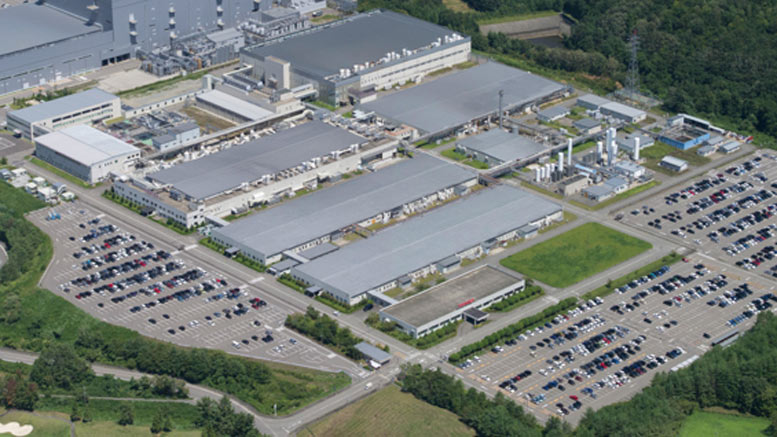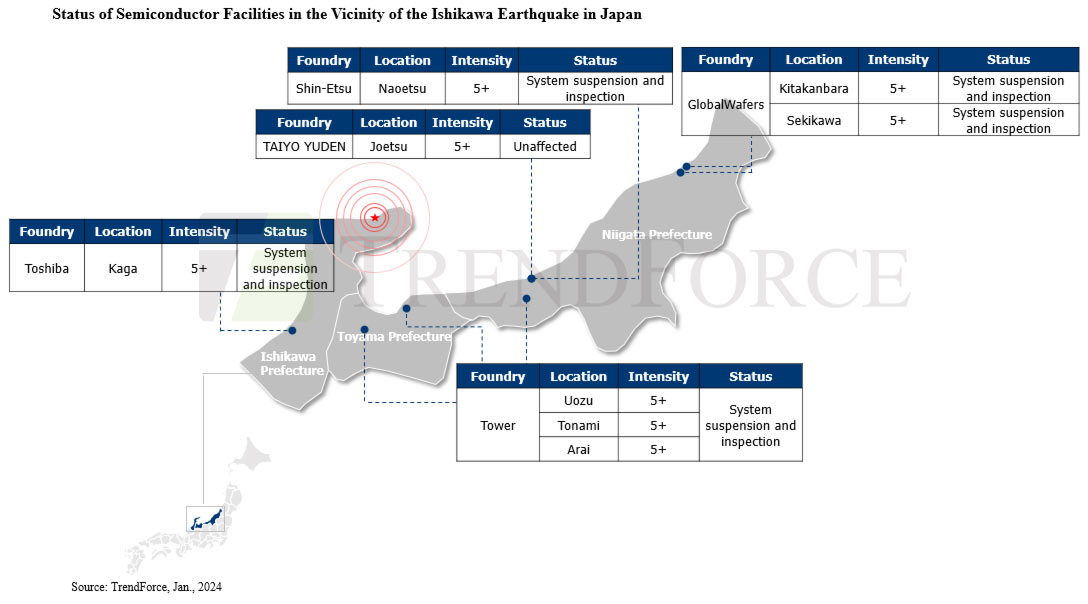Toshiba fab shuts down for checks – Japan’s earthquake affects PC component manufacturing [Updated]
Toshiba's Kaga location is very close to the epicenter of the 7.5 earthquake.

Update 01/04/2024: TrendForce, one of the sources quoted in our story, reached out to clarify that "Toshiba Kaga fab does not produce NAND, Toshiba Kaga has established one of each 6-inch and 8-inch fab in the area, with one additional 12-inch fab slated for completion in 1H24." Though running under the banner of Toshiba's Electronic Devices & Storage division, the temporarily closed fab is said to be "focused on the production of PMIC and logic IC."
Article continues:
The devastatingly powerful earthquake that hit Japan’s west coast on New Year’s Day has caused a great deal of human tragedy. It also looks like there could be consequences for PC component supplies, as Toshiba has announced a fab closure while it completes safety assessments.
TrendForce also noted that Taiyo Yuden, Tower, Shin-Etsu, GlobalWafers, and TPSCo have also temporarily halted semiconductor product manufacturing. It wouldn’t be surprising to see both supply and price impacts going forward.
With the violent and dramatic swaying and shaking inflicted upon structures due to the magnitude 7.5 earthquake, it is wise to survey them to check for damage. In its news center statement, Toshiba Electronic Devices & Storage says that its Nomi City, Ishikawa Prefecture fab is currently out of action, awaiting the completion of a thorough assessment.
Toshiba’s statement stresses that all employees who came to work on the day of the 7.5 earthquake have been confirmed to be safe and well. It is still trying to contact some employees on vacation to check their well-being.
Looking at TrendForce’s map of the affected semiconductor makers, Toshiba’s Kaga location (above) might be one of the closest to the epicenter of the 7.5 earthquake. Naturally, Toshiba is currently carefully “checking damage to infrastructure and production lines.” We don’t have any preliminary information regarding the scale of damage to the fab. Thus, we don’t know if Toshiba is checking out of pure caution or if there was some serious visible damage done to its buildings or machinery. An update is promised for 5pm Japan time on Friday (3am EST, Friday), so we hope things will become clearer then.
Get Tom's Hardware's best news and in-depth reviews, straight to your inbox.
On Friday, we cautiously expect a schedule for resuming production will also become clear. Toshiba currently states that it will make a decision on resuming “as soon as assessments on status of production lines is completed.”
Overall, there seems to be upward pricing pressure on NAND / storage as we start 2024. Firms began to intentionally restrict NAND flowing from their fabs in H2 2023 to try and prop up pricing and this seems to be working, for now. In November, there were multiple reports of NAND shortages on the horizon. Pressure on both the materials side and on the costs of production side were to blame for slimmer supplies, we heard.
The NAND market is complex, though, and simultaneously some factors push prices down, such as more efficient and denser NAND on the way for higher capacity devices at better prices. New China NAND fabs coming online with advanced and competitive NAND chips might also help keep storage prices down.
Time will tell if the temporary closure of the Toshiba fab has a significant impact on NAND availability and pricing, or whether it is just a drop in the ocean.

Mark Tyson is a news editor at Tom's Hardware. He enjoys covering the full breadth of PC tech; from business and semiconductor design to products approaching the edge of reason.
-
Giroro We've been through this all before.Reply
If not a convenient earthquake, or a fire, we'd be getting weekly stories about random "blackouts" and "water shortages" somehow destroying months worth of stock, which totally existed. -
hotaru251 Reply
while yes they companies do likely manipulate market (in both legal and illegal ways) this was likely a real issue.Giroro said:We've been through this all before.
If not a convenient earthquake, or a fire, we'd be getting weekly stories about random "blackouts" and "water shortages" somehow destroying months worth of stock, which totally existed.
The earthquake was bad & running the expensive equipment w/o checking could potentially cause more damages than shutting down would. (and long term) -
Giroro Replyhotaru251 said:while yes they companies do likely manipulate market (in both legal and illegal ways) this was likely a real issue.
The earthquake was bad & running the expensive equipment w/o checking could potentially cause more damages than shutting down would. (and long term)
The realness of the issues, and the legality of the actions taken in response to those issues is up to several armies of lawyers to argue with whichever world government takes the lead this time.
At the end of the day, the cartel who is semi-perpetually under investigation for price fixing, and occasionally (but repeatedly) found guilty of price fixing, has announced their intention to fix prices this year. It looks like that got started really fast too.
So they're going to find as many "non-imprisonable" excuses as they think they can get away with (which is probably a lot) to cut production to a point just slightly above whatever level angers investors.
So, as someone who knows nothing about the factory or the earthquake. I think it's pretty safe to say they'll find some reason to keep this factory (and any other plant even slightly affected by the earthquake, or solar flares, or anything) shut down for a long time.
I just want to skip the 2 year retread of tired BS clickbait, and fast forward to the part where criminal investigations are filed, all the production problems magically disappear, all the factories instantly reopen, nobody gets punished, and technology moves forward again for about another 2 years before the cycle restarts. -
hotaru251 Reply
and that would be stupid of them.Giroro said:I think it's pretty safe to say they'll find some reason to keep this factory (and any other plant even slightly affected by the earthquake, or solar flares, or anything) shut down for a long time.
Any profit > paying for a building you arent using to make profit.
yes, NAND companies reduced output to raise prices (which is legal as they have no legal requirement to produce a specific amount its up to their whim) but business is still business. -
JTWrenn Reply
Your comment feels very close to denying the pain Japan is going through right now. I get that these companies suck, but that doesn't mean it's ok to look at an earthquake and push conspiracies when people died. Chill out, have some class. They don't need to shut down factories to do this, just slow production which they can do on a whim.Giroro said:The realness of the issues, and the legality of the actions taken in response to those issues is up to several armies of lawyers to argue with whichever world government takes the lead this time.
At the end of the day, the cartel who is semi-perpetually under investigation for price fixing, and occasionally (but repeatedly) found guilty of price fixing, has announced their intention to fix prices this year. It looks like that got started really fast too.
So they're going to find as many "non-imprisonable" excuses as they think they can get away with (which is probably a lot) to cut production to a point just slightly above whatever level angers investors.
So, as someone who knows nothing about the factory or the earthquake. I think it's pretty safe to say they'll find some reason to keep this factory (and any other plant even slightly affected by the earthquake, or solar flares, or anything) shut down for a long time.
I just want to skip the 2 year retread of tired BS clickbait, and fast forward to the part where criminal investigations are filed, all the production problems magically disappear, all the factories instantly reopen, nobody gets punished, and technology moves forward again for about another 2 years before the cycle restarts. -
4m12020 Reply
"At the end of the day, the cartel who is semi-perpetually under investigation for price fixing, and occasionally (but repeatedly) found guilty of price fixing"Giroro said:The realness of the issues, and the legality of the actions taken in response to those issues is up to several armies of lawyers to argue with whichever world government takes the lead this time.
At the end of the day, the cartel who is semi-perpetually under investigation for price fixing, and occasionally (but repeatedly) found guilty of price fixing, has announced their intention to fix prices this year. It looks like that got started really fast too.
So they're going to find as many "non-imprisonable" excuses as they think they can get away with (which is probably a lot) to cut production to a point just slightly above whatever level angers investors.
So, as someone who knows nothing about the factory or the earthquake. I think it's pretty safe to say they'll find some reason to keep this factory (and any other plant even slightly affected by the earthquake, or solar flares, or anything) shut down for a long time.
I just want to skip the 2 year retread of tired BS clickbait, and fast forward to the part where criminal investigations are filed, all the production problems magically disappear, all the factories instantly reopen, nobody gets punished, and technology moves forward again for about another 2 years before the cycle restarts.
This is just false and cannot be substantiated with links. It was 17 years ago since price fixing happened. Memory and storage companies are constantly under the microscope now and have had charges brought up and dismissed for lack of evidence repeatedly. The fact is that they have been losing money on every NAND chip sale going on two years now, but people get upset when they raise prices to a point where they are just sustaining themselves.
